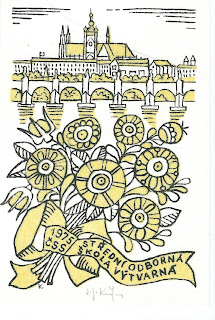I have frequently observed that being a Brit in the Czech Republic makes me understand my own nationality better. It is a combination of distance and being around people who see things differently, who find remarkable what I have taken for granted, that makes me look again at my country. And thus it is with the Scottish Referendum.
Yesterday I was sitting with a Czech outside a cafe in Brno when she asked me what I thought about what was happening. My answer was that it was up to the Scots to decide their future and as an English person it was not my place to interfere. She leaned forward with a disbelieving smile and said "But what do you feel?"
My response was one I have until now not expressed anywhere publicly and that is that I hope with all my heart that they say no. "My grandmother," I added, "would be turning in her grave, as we say in English."
"We have the same saying," she replied.
This grandmother was Betsy, who proudly displayed the family tartan on the mantlepiece. She was proud of being half Scot and half English and 100% British, I explained. I added that what I found so difficult is that like her I consider myself to be British first and foremost and that being English came a poor third after being European and possibly fourth after being a Gloucestershire girl.
What being British means for me is being part of a union of different races, countries and cultures. We retain our differences and respect (indeed love) those of the others in the union. But the sum of the union is greater than the parts and as a result we have been able to achieve so much more as a country than we should have. It is the principle of diversity writ large and enshrined in my country's identity. It is part of my identity. It is a principle and an approach to community that has constantly informed my work of community regeneration. And it hurts like hell to see it under threat.
I can't quite understand why it hurts so much. As a believer in community democracy I should be supporting self determination, shouldn't I? But for the Union to lose one of its founding members is to tear out a key thread from the diverse tapestry. The Scots have done so much, given so much, that to lose them would I fear make everything else come apart. As I said to my Czech interrogator I am afraid of what will follow.
In response she shook her head in sorrow. Like so many Czechs I know, she grieves for the reborn Czechoslovakia which was strangled in the cradle. "It was bad," she said, " for both of us, but worse for the Slovaks. I feel sorry for the Slovaks. You know Slovakia?" I have not been there. "It is beautiful, more wild than here, mountainous, further away. They had more problems." The two nations both paid economically for the split, but the Slovaks more than the Czechs. "They lied to us, the politicians. We still do not know the true cost of the separation. So many things had to be paid for - new money, new offices."
But it is not really the economic loss that counts, it is the loss of what might have been. A relatively small European country became two even smaller ones, dictated to by German and other foreign investors and in the case of Slovakia by the powers of the Eurozone. For the Czechs there was another less easily defined loss - one of identity. Even now they do not know what to call their country - they dislike "The Czech Republic," sometimes using Czechia or just Czech instead. In this I can see my problem as an English woman: I don't actually know what my country will be. I would like to think it will be the Albion of William Blake, but I fear that is more likely to be the England of Nigel Farrage.
"They lied to us, the politicians..." Indeed they did and indeed they do. The Velvet Divorce was agreed by the Czech and Slovak leaders without any form of referendum. The divorce was amicable, despite some arguments over gold reserves and the division of the military. A divorce is a good analogy and in the British case one partner is leaving the other, with all the anger, pain and insult-throwing that tends to come from a one-sided divorce. I would like to think that if the Scots vote yes, our respective leaders will sit down and negotiate a deal which works for both sides. But I don't believe it will happen. Already we see the peevish posturing and lies of politicians on the question of the £.
When the Czechs and Slovaks divorced both economies were hit and that was not when the world was recovering from a major recession. Fortunately because of how the politicians stitched up the divorce, the people of both countries were able to blame their politicians for their economic problems and not each other. The Czechs, when polled about which other country they would choose to live in, opt for Slovakia over any other. But in the British case - one country will have voted on the subject and one will not. If England goes into decline as the consequence of a yes result, would the love many English bear for Scotland survive the divorce?



























